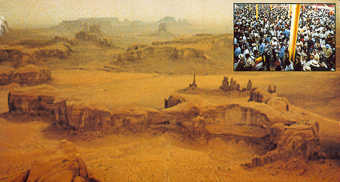
Note from Tierra y Vida: See story below...According to population trends, there will be 8.9 billion humans on Earth by 2050. But James Lovelock, who developed the Gaia Theory – the scientific theorem that Earth acts as a single self-sustaining organic system – warns that by 2100, only 500 million of us will still be living. If Lovelock is correct, roughly 17 out of 18 people will have died. The impacts of global warming will rival the death rate of the American Holocaust, the "Conquest" of indigenous
That's only the humans. If global warming approaches the levels it reached 250 million tears ago in the Permian Extinction – or the Great Dying, as it's known, 95% of all species could be extinguished.
A recent study by the British government shows that if current trends continue, a third of the planet will be desert by 2100. According to their calculations, areas susceptible to moderate drought will double, to 50% of the Earth's surface. Areas susceptible to severe drought will more than triple to 30% of the Earth's surface. According to Lovelock such impacts will continue for 200,000 years.
And that is nothing more than a glance at one threat – we’re leaving aside Peak Oil, with its all but certain probabilities of economic and agricultural collapse and a permanent and irreversible collapse of industrial society; and we also leave aside the chances of thermonuclear resource wars of the kind the Bush administration is currently preparing in places like Iran.
- Tierra y Vida
http://news.sawf.org/Lifestyle/28669.aspx
Climate change threatens mass extinction over next century, claims scientist
Posted on Wednesday, November 29, 2006 (EST)
A leading scientist has warned that billions of people may be wiped out over the next century due to climate change.
London, Nov 29: A leading scientist has warned that billions of people may be wiped out over the next century due to climate change.
Professor James Lovelock, who pioneered the idea of the Earth as a living organism, feels that as the planet heats up, the survival of humans will become difficult.
He warns that the global population may fall as low as 500 million, and that any attempts to tackle climate change will not be able to solve the problem.
Lovelock fears that as carbon dioxide emissions from man and the planet itself soar, the Earth will heat up causing water shortages, destroying life in much of the planet's oceans, and making it impossible for plants to grow.
"There is very good evidence of what happened 55 million years ago when as much carbon dioxide was put into the atmosphere by geology as is being done by us now," the Daily Mail quoted him as saying, while giving the 5th John Collier Lecture to the Institution of Chemical Engineers in London.
"Temperatures zoomed up by 8 degrees and stayed there for 200,000 years then came back to normal," he added.
Lovelock however acknowledges the fact that mankind has managed to survive many climatic disasters that occurred in the past.
"There have been at least seven of these major climate changes before and we have to adapt. It is going to be tough and there will be some evolution of humans during it," he said.
"The survivors will be those humans that can make their way to refuges or Arctic places and survive there," he added.
Although Lovelock does not say that all human species will be wiped out due to the heating of earth, he claims that the planet would not be able to support much over 500 million under such situations.
"I think an awful lot of people will die but I don't see the human species dying out. I would think a hot earth could not support much over 500 million," he said.
He warns that no simple solution to the problem of global heating is available, and that nothing can be done now to "save the earth".
"It is something quiet beyond humans at this stage in their evolution," he said.
He however stresses that people should continue doing whatever they can to reduce their impact on Earth. (ANI)







No comments:
Post a Comment